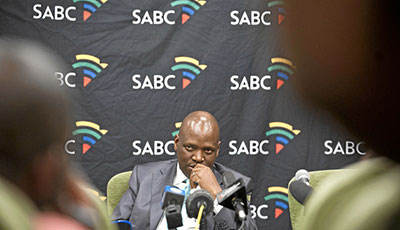South Africa is in the midst of one of its most important political events–the ruling African National Congress‘s Mangaung elective conference, which takes place once every five years to shape policy and elect new leadership. Because of the power of the ANC as South Africa’s leading political party, the conference holds not only the future of the party in its hands, but also the future of South Africa.
There is pressure on the country’s media to comprehensively cover the event–and there is an understanding that South Africa’s public broadcaster, the South African Broadcasting Corporation (SABC), will play its important role, informing and educating South African citizens about the elections, candidates, behind-the-scene battles, and the actual policies the ANC is planning to adopt on critical issues such as communications, education, and health.
Sadly, although there are pockets of excellent reporting, the SABC is falling short of this mandate. Not only is there not enough comprehensive coverage of the issues at stake at Mangaung, including discussion of the ANC’s policies, there have been worrying cases of direct censorship.
For example, there was the SABC’s decision to pull a harmless fish and chips advertisement that poked fun at President Jacob Zuma’s large family. Then came a crisis at SABC station MetroFM, when a radio talk show on media coverage of the Mangaung Conference was pulled moments before it was to go on air. The show was to feature a team of respected independent journalists, but SABC executives claimed that the panel did not include a representative of the ANC and the program could only be broadcast later when this had been organized. Then, a few days ago, the SABC canned a pre-recorded interview with South Africa’s most famous, critical, and feisty cartoonist, Jonathan Shapiro–known as Zapiro–on a program called “Interface.” Again SABC executives claimed that it couldn’t be broadcast because there was “no balancing of views.” In addition, there have been reports of a letter written by a group of unnamed SABC reporters, presenters, and producers highlighting their fears of political interference. And finally, Siki Mgabadeli, one of the most respected talk show hosts at SABC station SAFM, resigned, also reportedly after political interference.
The latest and possibly most worrying event is the SABC’s move to centralize editorial direction and control of all of its radio talk shows which deal with issues of politics and governance. This decision has far reaching implications for SABC journalists and for radio listeners who generally represent the poorer and more marginalized communities in South Africa–communities that have access to few options other than the SABC.
Respected non-governmental organization Media Monitoring Africa has pointed out some of the problems. What will happen to open-line shows where presenters take calls from listeners? What if the caller wants to talk about a political- or governance-related issue? As MMA points out, the concern ultimately is that presenters, producers, and talk-show hosts may be tempted to close down discussions rather than open them up if they fear violating this new process.
The SABC sits at the center of the South African media landscape. Its radio and television services reach to the furthest corners of the country. Its task as our premier public broadcaster is to develop informed citizens who can take control of their lives. This is a critical task– particularly in a developing country with its myriad of challenges around alleviating poverty and inequality. The SOS: Support Public Broadcasting Coalition–a coalition of NGOs, unions, and program makers–has vowed to fight these worrying trends through popularizing its vision document for a truly independent, accountable public broadcaster.
